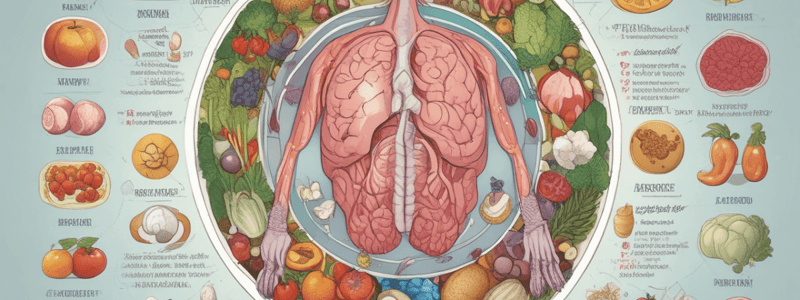Podcast
Questions and Answers
A person can survive for several weeks without water.
A person can survive for several weeks without water.
False (B)
Water helps to cushion and lubricate joints.
Water helps to cushion and lubricate joints.
True (A)
Water does not play a role in moving oxygen and nutrients throughout the body.
Water does not play a role in moving oxygen and nutrients throughout the body.
False (B)
Not consuming enough water can lead to dehydration.
Not consuming enough water can lead to dehydration.
Dehydration only causes thirst as a symptom.
Dehydration only causes thirst as a symptom.
Fluid needs do not change based on external conditions or physiological states.
Fluid needs do not change based on external conditions or physiological states.
Infants have a greater water need than adults.
Infants have a greater water need than adults.
Fluid leaves the body only through urination.
Fluid leaves the body only through urination.
Feeling thirsty is a signal that your body needs more water.
Feeling thirsty is a signal that your body needs more water.
One should drink enough water to avoid feeling thirsty.
One should drink enough water to avoid feeling thirsty.
Flashcards are hidden until you start studying
Study Notes
Nutrition
- Nutrition is the process by which the body uses food to sustain itself
- A healthy eating plan helps make food choices that benefit the body
Carbohydrates
- Main source of energy for the body
- Simple carbohydrates:
- Sugars (glucose, fructose, galactose, lactose) provide quick energy
- Complex carbohydrates:
- Polysaccharides (starches, cellulose) made of glucose
- Important for digestive system
- Carbohydrates broken down into glucose, regulated by the liver
Fats
- Provide energy for muscles and other body processes
- Important for absorption of vitamins and other nutrients
- Types of fats:
- Unsaturated fats (found in animal-based foods)
- Saturated fats (typically solid at room temperature)
- Trans fats (created through hydrogenation)
Vitamins
- Necessary for normal growth and development
- Help with body processes, including breathing, digestion, and energy use
- Two categories:
- Fat-soluble vitamins (Vitamins A, D, E, K): dissolve in fat, stored in the body
- Water-soluble vitamins (Vitamins B, C): dissolve in water, not stored in the body
Fat-Soluble Vitamins
- Vitamin A: healthy cells, normal vision, and healthy teeth
- Vitamin D: calcium absorption, strong teeth and bones, immune function
- Vitamin E: protects against oxidation, immune function, and blood circulation
- Vitamin K: healthy bones, blood clotting, and protein formation
Water-Soluble Vitamins
- Vitamin B1 (Thiamin): energy production from carbohydrates
- Vitamin B2 (Riboflavin): energy production, healthy cell growth
- Vitamin B3 (Niacin): energy production, healthy skin and nerves
- Vitamin B5 (Pantothenic Acid): energy production
- Vitamin B6 (Pyridoxine): energy production, nerve function, and red blood cell production
- Vitamin B7 (Biotin): metabolism of carbohydrates, fat, and protein
- Vitamin B9 (Folate): cell division and red blood cell production
- Vitamin B12 (Cobalamin): red blood cell production and central nervous system
- Vitamin C (Ascorbic Acid): collagen production, wound healing
Minerals
- Major minerals:
- Calcium: muscle, heart, and digestive system health, bone development
- Phosphorus: bone health, energy processing
- Magnesium: bone health, energy processing, and immune response
- Sodium: metabolism, nerve cell function
- Potassium: heart function, fluid balance
- Chloride: fluid balance, immune response
Water
- Necessary for most body functions
- Maintains body temperature, lubricates joints, and protects spinal cord
- Helps remove waste, moves oxygen and nutrients throughout the body
- Body loses water daily through urination, breathing, and exhalation
- Dehydration can cause thirst, fatigue, headaches, and constipation
- Fluid needs change based on factors such as pregnancy, breastfeeding, and physical activity
Studying That Suits You
Use AI to generate personalized quizzes and flashcards to suit your learning preferences.



